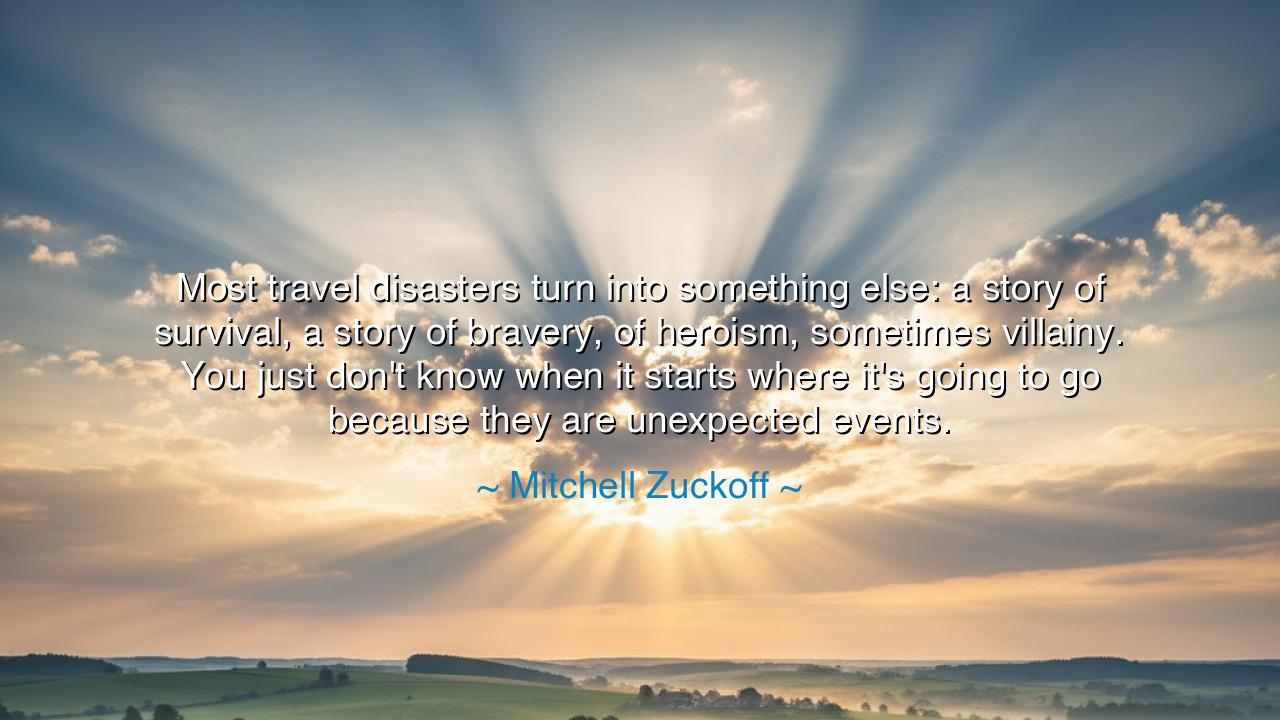
Most travel disasters turn into something else: a story of
Most travel disasters turn into something else: a story of survival, a story of bravery, of heroism, sometimes villainy. You just don't know when it starts where it's going to go because they are unexpected events.






Hear the words of Mitchell Zuckoff, who declared: “Most travel disasters turn into something else: a story of survival, a story of bravery, of heroism, sometimes villainy. You just don’t know when it starts where it’s going to go because they are unexpected events.” At first, these words are the reflection of a storyteller who has chronicled calamities and triumphs. Yet within them lies a truth as old as the journeys of mankind: that hardship on the road is never the end of the tale, but the beginning of transformation. For it is only when the path breaks, when fate throws obstacles, that the hidden nature of men is revealed.
The phrase travel disasters does not speak only of broken ships or failed flights, but of every sudden storm of life. A journey begun in joy may turn to trial, and what was meant as a simple passage becomes a crucible. Yet Zuckoff teaches that even in disaster, a deeper narrative unfolds. What seems calamity in the moment becomes, in memory and in history, a story—one of courage or cowardice, faith or betrayal. The disaster is but the stage; the true drama is the soul’s response.
Consider the tales of survival that sprang from catastrophe. When Ernest Shackleton’s Endurance was crushed in the Antarctic ice, the voyage was a disaster of the highest order. Yet from that wreckage came not only loss, but one of the greatest sagas of leadership and perseverance. Shackleton and his men endured unimaginable hardship, yet they survived together, and their story shines brighter than any triumph unmarred by trial. The disaster became legend, for it revealed the depths of human resilience.
So too, there are stories of bravery and heroism, born in moments when death was near. In air crashes, on lost expeditions, or in shipwrecks at sea, men and women have stepped forward to sacrifice themselves for others, to protect the weak, to defy despair. These are the sparks of light that shine against the darkness, the deeds that echo long after the wreckage is forgotten. Without the disaster, such acts would never have been called forth, for only in the tempest does one learn who truly stands firm.
Yet Zuckoff does not flinch from naming villainy as well. For in the crucible of chaos, not all are ennobled. Some reveal greed, cowardice, or betrayal. History remembers these too, as warnings. When the ship Medusa was wrecked in 1816, its survivors built a raft, but selfishness and cruelty turned the disaster into a tale of horror. Cannibalism and brutality prevailed, and the painting of that tragedy—The Raft of the Medusa—still haunts us as a reminder that man may rise to angel or fall to beast when tested by fate.
The unexpected events of travel mirror the unexpected turns of life. No one sets forth anticipating calamity, yet the sudden storm, the broken wheel, the wrong road—all remind us that life itself is fragile and uncertain. What matters is not the avoidance of disaster, for none can avoid it forever, but the transformation of disaster into meaning. Zuckoff’s words remind us that when the journey breaks, the story truly begins, and that our response to the unexpected will define us more than any careful plan.
The lesson for us is clear: when faced with disaster, do not despair, for it is the seed of a greater story. Respond with courage, with compassion, with endurance, and you will turn calamity into testimony. Practically, this means preparing the heart as much as the body—cultivating virtues before the storm comes, so that when it does, your soul is ready. Train yourself in patience, in kindness, in faith, so that when the world breaks, you are not broken with it.
Therefore, children of tomorrow, remember the wisdom of Mitchell Zuckoff: disasters are not the end, but the forge of stories that endure. Whether you rise as hero or sink into villainy depends not on fate, but on the choices of your heart when the unexpected comes. Embrace the trials of travel and of life, for though they are bitter in the moment, they may become the sweetest legacies you leave behind. For man is not judged by the journey begun in calm seas, but by the tale that arises when the storm has passed.






AAdministratorAdministrator
Welcome, honored guests. Please leave a comment, we will respond soon